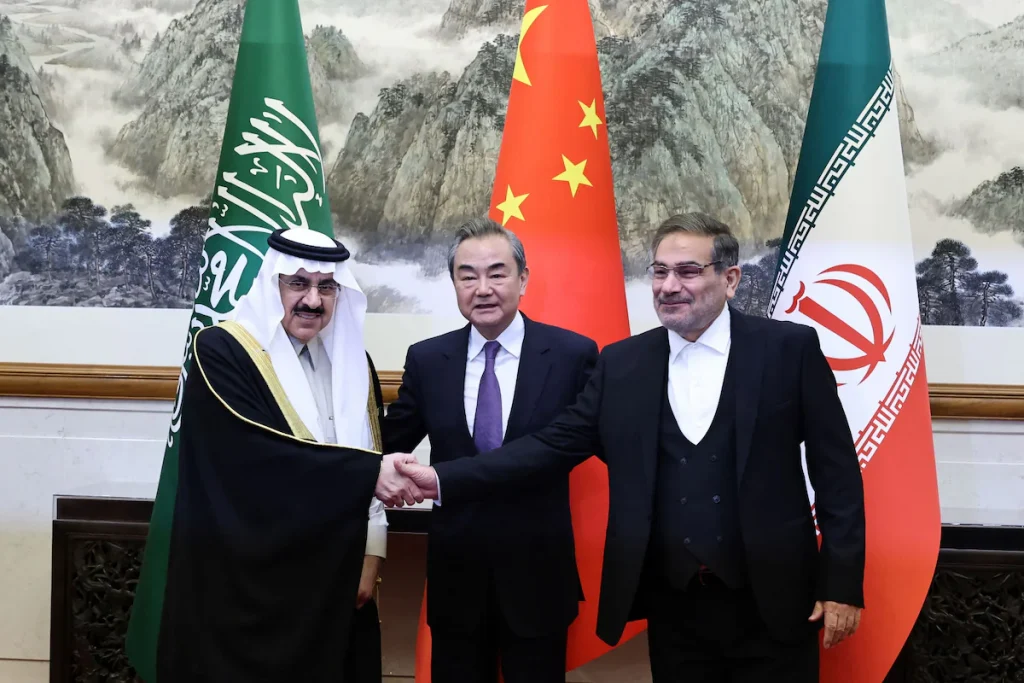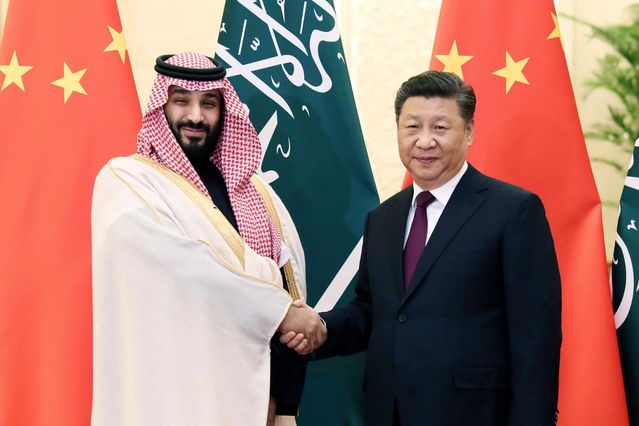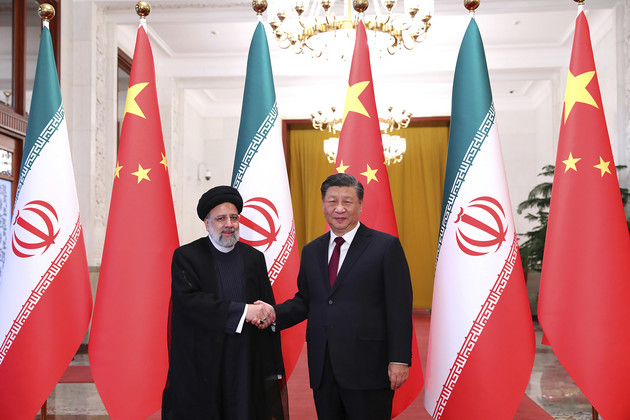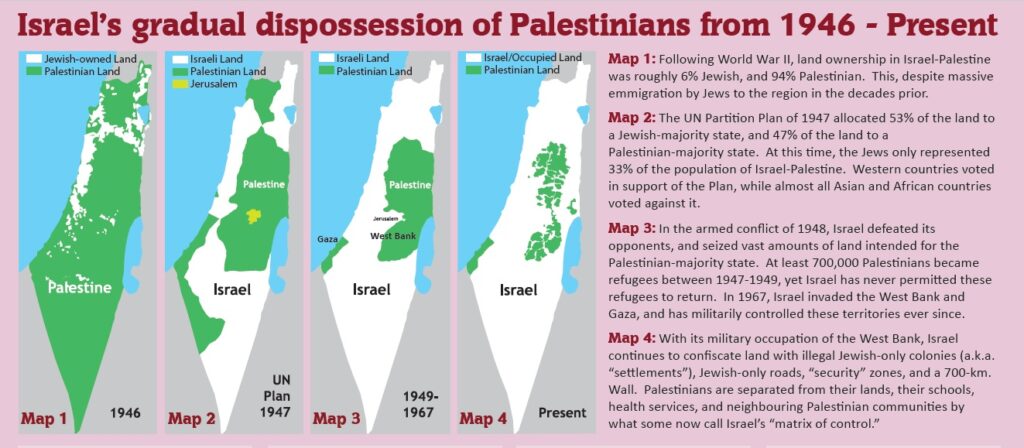China-brokered Saudi-Iran Détente Upsets U.S. Mideast Paradigm

By: John Mason / Arab America Contributing Writer
Here, we review the recent China-brokered Saudi-Iran détente. It is suggested that this will upset U.S. and Israeli interests. Some critics say this move by China is a poke in the U.S. eye. Will it allow China to overtake the U.S. as Middle East power broker? This article details possible worries for Israel stemming from the Saudi deal with Iran. It also reviews what the détente might mean for Palestinians, especially in the backdrop of a rabidly right-wing and very hungry-for-territory Netanyahu government.
China Deal an Eye-opener, perhaps the ‘proverbial Middle-finger’ to Biden
Compliments of China, Iran and Saudi Arabia announced their agreement to restore diplomatic relations. Saudi and Iran agreed to restore their ties and reopen embassies. While signaling a willingness to mend their differences suggests, in Saudi eyes, the waning influence in the region is that of the U.S. The Washington Post perhaps put the détente issue best: “China’s successful brokering of a detente between Iran and Saudi Arabia on Friday forced the United States into the awkward position of applauding a major Middle East accord secured by its main geopolitical rival.” The U.S. had to save face by admitting that any de-escalation of tensions there is better than nothing.
This is a geo-political quagmire. First, according to Yahoo News, “Tehran and Riyadh are historic rivals, and both have fueled a devastating eight-year war in Yemen as they’ve vied for greater influence in the Middle East. The Saudi and Iranian governments reestablishing diplomatic ties lowers the temperature in the region and raises hopes that their proxy war in Yemen will come to an end.” Simultaneously, per Yahoo, “the deal amounts to a slap in the face to the Biden administration. It’s a sign that the Saudi government, under Crown Prince Mohammed bin Salman, is willing to increase ties with US adversaries, and could have major implications for the future of the region.”
The situation is all the more stunning as relations between the U.S. and China are at a low ebb, to put it mildly. Here, we have Saudi leader Mohammed Ben Salman (MBS), tying his kingdom to Beijing while legitimizing Tehran. “It’s a middle finger to Biden and a practical calculation of Saudi interests,” according to one prominent former official in the U.S. State Department. China’s growing influence in the Middle East is linked to “decades of US dominance in the region largely catalyzed by the war on terror. Post-9/11 U.S. influence in the region has been driven by the pretext of protecting the American shoreline.”

China’s brokering of the Saudi-Iran deal is significant in innumerable ways, to be considered ahead, but for the moment, a more benign sense emerges. Per Yahoo, “It shows the role that China could play in fostering a Middle East defined more by cooperation and trade and less by conflict and weapons sales, as has been the norm under US dominance.” That is a striking image of a calmer Middle East, although the Israeli-Palestinian conflict still lingers, ready to rear its ugly head at any moment.
China overtakes U.S. as Middle East Power Broker after decades of U.S. Failures
The Washington Post perhaps put the détente issue best: “China’s successful brokering of a detente between Iran and Saudi Arabia on Friday forced the United States into the awkward position of applauding a major Middle East accord secured by its main geopolitical rival.” The U.S. had to save face by admitting that any de-escalation of tensions there is better than nothing.
The Saudi-Iran agreement was brokered directly by Chinese President Xi Jinping. Of course, China is the U.S.’ No. 1 nemesis, its “No. 1 geostrategic threat.” So, the agreement represents, according to the Post, “the latest effort by Xi to stake out a larger political presence in the Middle East, where the United States has been the dominant outside power brokering agreements since the end of the Cold War, waging wars and exerting influence in an oil-rich region vital to the world’s energy security.”
Saudi has been moving away from the U.S. administration ever since the 2018 killing of Washington Post journalist Jamal Khashoggi. Almost certainly, that assassination was carried out by associates of Saudi crown prince MBS. Saudi has also drifted away from the U.S. because of criticisms of Saudi’s human rights record, including its curbing of criticisms of political freedoms and elections. China is hardly in a position to accuse Saudi of these shortcomings, given its own record of abuse.
One positive outcome of the Iran-Saudi accord is a possible end to the war in Yemen. That conflict is in fact a proxy war between Saudi and Iran, in which the U.S. has supported the Saudi side with American-made jets and Iran has backed the Houthi militants. Since a UN sponsored truce has been in place since last April, an end to that war is hopeful.
As to U.S. “failures,” we have to recall that all of the efforts to bring peace between Israelis and Palestinians have either stalled or failed outright. President Carter succeeded in bringing peace between Israel and Egypt and Jordan, respectively, though Palestinians were not part of that configuration. For the remaining presidential efforts, Israel’s ambition to occupy and slowly encroach on Palestinian lands was rarely thwarted. Simply put, Israel’s encroachment on the West Bank has resulted in huge portions of those lands being stolen.

Iran-Saudi-Chinese relationship threatens U.S. standing on the World stage
Analysts believe that China’s success in bringing together archenemies Iran and Saudi Arabia causes concern over U.S. influence not only in the Middle East region but on the global stage. China now has bragging rights over its “victory for dialogue,” as China’s top diplomat framed it. Now these two regional powerhouses, Iran and Saudi, have backing from the two most powerful totalitarian states, Russia and China. Tehran provides Russia with weapons in support of its invasion of Ukraine. Saudi also supports Russia, through its refusal to increase oil production, thus keeping world oil prices higher, including Russia’s, and thus fueling its escalation of attacks on Ukraine.
On the other front, China now serves as a buffer between Iran and Israel, the latter of whom wants to eliminate Iran’s nuclear weapons development. China’s role also softens the U.S. indictment of Iran as it progresses toward the nuclear bomb, in its crackdown on protesters over women’s rights, and for Iran’s raising tensions with Israel.
Israel’s efforts to thwart Iran are now tempered. According to USNews, “The Saudi-Iran detente sets back Israeli Prime Minister Benjamin Netanyahu’s efforts to isolate Tehran, but time will tell whether it also hinders his outreach to Riyadh or planning for any eventual military strike against Iranian nuclear sites.” Perhaps more worrisome to Israel in the context of the Iranian-Saudi deal is that the U.S. appears to be losing influence in the region at the very moment that Netanyahu’s government may need it most.
Worries for Israel stemming from Saudi deal with Iran, What it might mean for Palestinians
Netanyahu has long opposed Iran, his wish is to isolate it, and disempower it. He believed the Abraham Accords, commercial agreements between the U.S. and Bahrain, UAE, Sudan, and Morocco, would shore up his credibility with other Arab states. Those accords he also hoped would further isolate Iran. With Saudi now in the mix, that intention is dampened. Both Iran and Saudi agreed on their insistence on a resolution of the intransigent Israeli-Palestinian conflict.

Netanyahu has prized the stabilization of relations with Saudi, which may now be offset by the new détente. As news source Politico noted, “A normalization deal with Saudi Arabia, the most powerful and wealthy Arab state, would fulfill Netanyahu’s prized goal, reshaping the region and boosting Israel’s standing in historic ways. Even as backdoor relations between Israel and Saudi Arabia have grown, the kingdom has said it won’t officially recognize Israel before a resolution to the decades-long Israeli-Palestinian conflict.”
That last Saudi caveat, not opening diplomatic relations before the Israel-Palestine issue is resolved, is critical, especially if the Saudis stand by their long commitment to the Palestinians. Politico has reported, however, that “the Saudi-Iran deal that was announced Friday has thrown cold water on those [Israel’s] ambitions. Saudi Arabia’s decision to engage with its regional rival has left Israel largely alone as it leads the charge for diplomatic isolation of Iran and threats of a unilateral military strike against Iran’s nuclear facilities.”
Israel will not so easily have smooth sailing with Saudi as it has with Abraham Accords with other Arab countries. Noting Saudi’s stricter interpretation of those accords, according to an expert quoted in USNews, “the Israeli occupation of the West Bank remained more of a barrier to Saudi recognition than differences over Iran. The Saudi leadership is engaging in more than one way to secure its national security.” Saudi is also dancing around the normalization issue by suggesting the U.S. help with its development of “a civilian nuclear program” and to lighten its restrictions on U.S. arms purchases.
Saudi has expressed in a steadfast fashion over decades its support of the Palestinians. As USNews reported, “Saudi Arabia has linked any move by the kingdom to normalize ties with Israel to a resolution of Palestinian statehood goals.” That is about as plainly put as possible. Whether this new détente with Iran will make Saudi more susceptible to playing the game of realpolitik is unknown. It seems, however, that Saudi would be the last power to leave the Palestinians out to dry.
That doesn’t mean the U.S. shouldn’t step up in support of Palestinians—it has in the past but not persistently enough to mediate a peace based on justice. It supports justice for some people unequally, such as Ukrainians in the face of the Russian onslaught. What about Palestinians in the face of a rabidly right-wing and very hungry-for-territory Netanyahu government?
Sources“
–“Saudi Arabia making peace with Iran in a deal brokered by China is a ‘middle
finger to Biden’,” Yahoo News, 3/10/2023
–“China brokers Iran-Saudi Arabia detente, raising eyebrows in Washington,”
Washington Post, 3/10/2023
–“Saudi-Iran Detente: a Setback for Israel and Wake-Up Call on US Ties,” USNews,
3/12/2023
–“Saudi deal with Iran worries Israel, shakes up Middle East,” Politico/Associated
Press, 3/12/2023
John Mason, PhD., who focuses on Arab culture, society, and history, is the author of LEFT-HANDED IN AN ISLAMIC WORLD: An Anthropologist’s Journey into the Middle East, New Academia Publishing, 2017. He has taught at the University of Libya, Benghazi, Rennselaer Polytechnic Institute in New York, and the American University in Cairo; John served with the United Nations in Tripoli, Libya, and consulted extensively on socioeconomic and political development for USAID and the World Bank in 65 countries.
Check out our Blog here!








